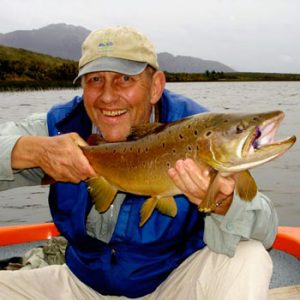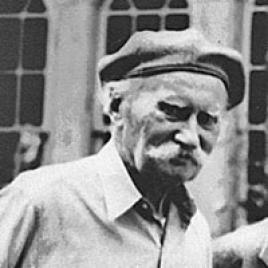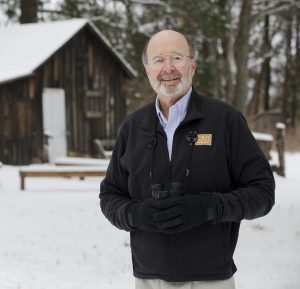WCHF has announced the selection of three conservation leaders for induction into the Hall of Fame on April 25, 2020 at the SentryWorld (the Atrium) in Stevens Point. The 2020 Induction Ceremony will celebrate our 100th inductee into the Hall of Fame.
The Inductees – Stephen Born, Jens Jensen and Stanley Temple
The inductees this year will be Stephen Born, a well-known UW-Madison professor who specialized in environmental planning and worked on almost every aspect of water management, from the Great Lakes to inland lakes to groundwater and rivers and watersheds, and is an expert fly fisher; Jens Jensen, a landscape architect who developed many of our Midwest parks, focusing on indigenous plants and ecological processes of this region’s prairie landscape, and also founded the “school of the soil” in Door County known as The Clearing; and Stanley Temple, a UW-Madison professor who worked in the areas of habitat fragmentation, invasive species and other factors leading to species declines He now serves as a Senior Fellow with The Leopold Foundation, researching, writing and speaking about Leopold.
The Induction Ceremony
The public is invited to join us in the day’s events held at SentryWorld. SentryWorld is located at 601 Michigan Ave N, Stevens Point, Wisconsin
9:00AM Social Time & Coffee Reception
9:45AM Welcome
10:00AM Induction Ceremony
1:00PM Luncheon
The Induction Ceremony and Coffee Reception are free; there will be a fee for the luncheon. Reservation information will be announced soon. Watch this blog post for more details. Again, all activities are open to the public.
Inductee Biographical Summaries
Stephen Born
Stephen Born’s impact on conservation in Wisconsin and beyond is so broad and varied it almost defies description, except to say he has been tireless in his work.
A resident of Wisconsin since 1969, he was a faculty member in the Department of Urban and Regional Planning at UW-Madison for 36 years, a director of State planning and energy offices and a founder of non-governmental conservation organizations like the River Alliance of Wisconsin.
An intrepid angler, he is also co-author of “Wisconsin’s Trout Streams: The Anglers Guide,” a seminal work which focuses not only on where to fish, but also on stream ecology and the story of how these cold-water treasures were saved and restored.
His broad range of services included co-chairing the Waters of Wisconsin Initiative of the Wisconsin Academy of Sciences, Arts and Letters. He has served on national and State Trout Unlimited senior leadership boards, including presidency of Wisconsin Trout Unlimited. He was a chief advisor to former Governor Patrick Lucey on the decision not to dam the Kickapoo River in the 1970s, which led to the creation of the 8,500-acre Kickapoo Reserve. He served on Gov. Tommy Thompson’s Blue Ribbon Stewardship Task Force. He also had key roles in development of policy on Wisconsin’s ground water and coastal resources.
These are but a few of his contributions to State and national conservation causes. Born is simply a force of nature when it comes to bringing people with differing views and ideologies together to forge unified and strong coalitions to protect Wisconsin’s natural resources. Since he continues to serve a number of non-profit groups as a board member or other volunteer, his resume is still under construction.
Jens Jensen
Danish born Jens Jensen was a landscape architect and a tireless advocate for conservation of our natural heritage. Aesthetics, in his work, always came second to protecting nature. Through his vocation and avocation, his aim was to bring people and nature together. Upon his death, the New York Times called him “dean of American landscape architecture.”
In 1913 Jensen initiated Friends of Our Native Landscape. There were chapters in Wisconsin, Illinois, and Michigan with several hundred members, including Aldo Leopold. Jensen was a persistent proponent for national parks, forest preserves, state parks, state forests, scenic areas, county parks, and sanctuaries with notable successes in Wisconsin, Illinois, Minnesota and Florida.
He was a strong proponent of urban planning and railed against urban sprawl, especially when it intruded on natural areas. He was instrumental in development of a plan for parks throughout Chicago and in establishing the Cook County Forest Preserve, a collection of dozens of wetlands, forests, and prairies, throughout greater Chicago. Jensen campaigned against urban sprawl along the southern Lake Michigan shoreline, leading to creation of Indiana Dunes National Park, contiguous with Indiana Dunes State Natural Area.
Jensen moved to Door County in Wisconsin in 1935, where he zealously continued his advocacy for protection of natural areas. He was a principal proponent of The Ridges Sanctuary, Cave Point county park, Whitefish Dunes state park, and Ellison Bay Bluff county park among others. One of Jensen’s many legacies is The Clearing, established on his Door County property in 1935 with the aim of immersing people in nature for “spiritual renewal.” Thousands have attended a short-course at The Clearing, now a non-profit school, where Jensen’s philosophy of working with nature is the pervasive theme.
Stanley Temple
Stanley Temple’s impact on Wisconsin’s natural resources has been wide. He has worked as a scientist, communicator and teacher. During his 32 years on the faculty of the UW-Madison Department of Forest and Wildlife Ecology, he worked on endangered species such as Peregrine Falcon, Trumpeter Swan and California Condor. His research on habitat fragmentation has helped manage areas such as the Baraboo Hills. Temple’swork has been instrumental in the areas of habitat fragmentation, invasive species and factors leading to species declines.
Now that he is re tired, he helps spread Aldo Leopold’s Land Ethic as a Senior Fellow for the Aldo Leopold Foundation, researching, writing and speaking about Leopold. Using Leopold’s original botanical records and more recent surveys, Temple co-published new research on climate change impacts on plant phenology through the paper “Record-Breaking Early Flowering in the Eastern United States.” He brought the Passenger Pigeon alive to Wisconsinites with presentations and articles during the 100th anniversary of the passing of the pigeons in 2014, and he has advised organizations such as The Nature Conservancy, International Crane Foundation, Wisconsin Society for Ornithology and Aldo Leopold Foundation.
Temple created and was the first editor of the peer-reviewed journal Bird Conservation published by Bird Conservation International, served as the editor of the Wisconsin ornithological journal The Passenger Pigeon published by the Wisconsin Society for Ornithology, and served as associate editor of the peer-reviewed scientific publication of the American Ornithological Society (AOS) The Auk and the scientific journal of the Ecological Society of America Ecological Applications.
Temple continues his life work today on behalf of Wisconsin’s natural resources. He is frequently cited as an expert not only on the State’s natural history, but as one who has worked to protect it.



